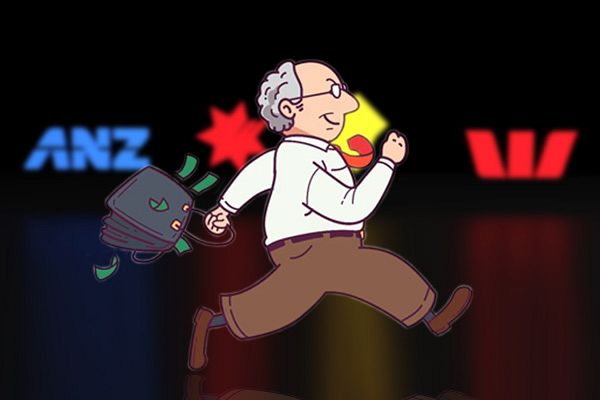Dr Evan Jones continues his examination of white-collar crime from the corporate banking sector. Part 1 can be read here.
Behind The Sure Thing podcast
The podcast The Sure Thing has been created by a team at the Australian Financial Review (AFR). One casts no aspersions on the lead man behind the podcast, Angus Grigg. However, the AFR has never been known as a champion of the little guy, especially regarding financial matters. It has perennially coddled up to bank executives to gain access, only to print interviews and stories that reflect banker interests. Its coverage of small business has been superficial, especially when corporate predation is involved.
Grigg claims that the AFR is a noted analyst of ‘power’. I don’t think so. Its exposé of the Offset Alpine Printing fire affair is legendary, with many colourful characters involved, but one wouldn’t place that disgraced lot within the Australian business establishment.
Remarkably, AFR journalists took a jaundiced view towards the need for a Royal Commission into the financial sector — such as veteran financial columnist Tony Boyd in November 2017. Although AFR reporting on Commission proceedings was solid, analysis was condescending to bank critics. The depths were plumbed in a May 2018 article by Aaron Patrick, ‘For Bankwest “victims”, the conspiracy gets bigger’. Foreclosed CBA/Bankwest borrowers were the prime target of this article, but aggrieved borrowers, in general, were denigrated. I dealt with this profound unprofessionalism in an article titled ‘Fake news at the Australian Financial Review’.
The CBA has been a big advertiser in Fairfax media, but this sucking up to the CBA is unfathomable. The CBA’s internal documentation of the terms of the Bankwest takeover and the machinations in the takedown of Bankwest borrowers has never been subpoenaed, so this surety regarding the CBA’s righteousness is unwarranted.
More, the Kamay/Hill insider trading podcast has been sponsored by McGrathNicol, self-described as ‘Australia’s leading investigations and cyber firm’. Whatever that means. Simply, McGrathNicol is in the receiver and liquidator business. This is a down and dirty sector riddled with malpractice, yet acting with impunity. A Parliamentary Inquiry into the sector in 2010 targeted a small player but left the malpractice intact. Surprisingly, one ASIC Chairman, Tony D’Aloisio, left that significant public interest post to go straight into this sector without anybody in authority batting an eyelid.
McGrathNicol has its own black mark when it presided over the receivership in 2005 of Ron Coomer’s commercial laundering business in regional Queensland on behalf of Suncorp. Coomer alleged a depredation of his business and complained to ASIC. ASIC told Coomer to bugger off.
If McGrathNicol wants to sponsor anything, it could sponsor a clean-up of the corrupt receiver/liquidator sector in which it resides.
FX markets as a casino
I confess to a moral flaw — I can’t get excited about insider trading transgressions. Most derivatives market trading is speculative, profit-driven, contrary to the needs of material goods and services trading.
Certainly, an ABS staffer disclosing then-secret official data is an ugly phenomenon. But what is rational and functional about the market in which Kamay was trading? “Market expectations” regarding certain economic indicators meet the real figures on release day, which leads to immediate buying and selling of the currency. By whom and for what purpose?
What is the relevance of a currency’s fluctuations centred on ignorance and short-termism? A classic example was the thrashing of the AUD by “the market” after the “unexpected” current account deficit for April 1986 and Treasurer Paul Keating’s intemperate description of the country as a “banana republic”. Yet the current account deficit was a natural outcome of the country’s structural imbalances and the ascendancy of a neoliberal agenda that saw no role for strategic industry policy. Currency traders had and have no knowledge nor interest in economic fundamentals.
Podcast compere Grigg claims that the NAB’s trading room culture is innocent of any link to Kamay’s mentality. But the description of Kamay’s work environment at the NAB makes it likely that that heady pressure cooker environment was influential in fuelling Kamay’s drive for big betting successes and in breaking the rules to make them. This from the bank that brought us the 2003 trading desk scandal and which promised, after CEO and Board chairman departures, that the bank had turned over a wholly new leaf.
Corporate white-collar crime
No Australian bank employee, high or low, has ever been indicted, leave alone gaoled, for crimes committed within the corporate entity against a customer — in particular, against borrowers. Employees who have stolen from their bank employer certainly, but not if they have defrauded, in their employer’s name, a customer.
The door-stopping Corporations Act is useless in practice. Ditto the much-heralded ‘Reforms to strengthen penalties for corporate and financial sector misconduct’, aka the “ASIC Enforcement Bill”, overseen by the Federal Treasury in late 2018. All just so much hot air. The Criminal Code Act 1995 is suggestive but ignored.
The fundamental conceptual dilemma is: how does one attribute a sin committed by the corporate entity to responsible individuals within the shell? This crucial subject doesn’t seem to exercise the minds of Australian legal academics. Hence the immunity of banking staff and their impunity, especially when facing prospective small business and family farmer borrowers who face a relationship of structured dependence and subordination. Contract law ignores the profound asymmetry of the credit relationship, where the lender can default the borrower at will.
The psychology of corporate crime
The AFR insider trading podcast devoted much attention to analysing the psyche of the protagonists Kamay and Hill. Program consultant Professor Clinton Free suggested three important dimensions (at least for the self-confident Kamay) — narcissism, Machiavellianism and psychopathy.
With corporate crime, one faces a complicated structure of the “personality” of the corporate entity itself and the (dialectically related) personalities of a succession of key staff.
However, the significant motif here is not any individual corporation’s personality but the generic structural characteristics of the joint-stock limited liability corporation itself. This weird beast has acquired the status of a person at law. Yet (attributed to Edward, Baron Thurlow, British Lord Chancellor 1778-92): ‘Did you ever expect a corporation to have a conscience, when it has no soul to be damned, and no body to be kicked?’
The corporation, by construction and evolution and especially in collaboration, has the purpose (profit), the capacity and the power to do what it wants. Period. Joel Bakan’s 2004 book and film The Corporation: the pathological pursuit of profit and power capture its essence.
The corporate entity’s personality is that of the psychopath. Behind that armour, the corporation’s executive’s personality is, amongst other traits, Machiavellian. It is a collective personality ideally suited to crime. The banking sector’s DNA is of particular significance for three reasons: its fundamental role in economic society, the asymmetry of the credit relation and the brutality and potential scale of the crimes against its victims.
Can we expect that a future AFR podcast will be devoted to an equally gripping corporate white-collar crime scenario?
Dr Evan Jones is a retired political economist.
Related Articles
 This work is licensed under a Creative Commons Attribution-NonCommercial-NoDerivs 3.0 Australia License
This work is licensed under a Creative Commons Attribution-NonCommercial-NoDerivs 3.0 Australia License
Support independent journalism Subscribe to IA.















